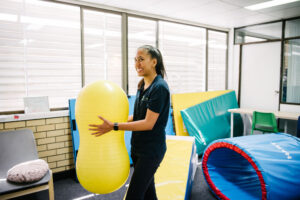What is Interoception?

Hello, it’s Kiara here – an occupational therapist at Cooee Speech Pathology. Recently, many families have been asking questions about interoception. What is it? Why is it important? How can we help?
As this is an emerging area of practice, there is an increase in the amount of articles and research around interoception and the term interoception is currently being used frequently within the paediatric occupational therapy space.
However, the explanations and definitions vary across different areas of practice. In lieu of this, this blog post aims to provide some clarity around what interoception is.
What is Interoception?
Interoception provides us with the ability to feel our internal organs and skin and allows us to understand the internal state of condition of our body.
It is well known that we have five basic senses:
- Sight
- Taste
- Touch
- Smell
- Sound
In recent years, we have also begun to be more aware of two additional senses:
- Vestibular: which provides information about balance and movement, and supports us to know where our body is in space.
- Proprioception: which allows us to know where our body parts are in relation to each other.
Interoception can be referred to as the 8th sense.
It’s a sensory system that receives information from receptors in cells from our organs, muscles and skin, allowing us to register and understand what we’re internally feeling. This links with regulation.

What is regulation?
Regulation is having the capacity and energy to match the task at hand. This is our ability to tackle a task regardless of emotion. It’s also our ability to navigate what is happening for us so that we feel okay.
What is interoceptive awareness?
Interoception includes two aspects – our body state and emotional state.
- Body state: the basic functions and conditions of our body, including hunger, thirst, temperature, illness.
- Emotional state: our moods or emotional conditions, such as sadness, fear, excitement and happiness.
Interoception is necessary for us to make sense of our experiences and forms the foundation for how we understand ourselves and engage with our world. Interoceptive awareness is our ability to understand our own body cues and what that means. It’s important to remember that what one thing means for me, can be different to what it means for someone else.
Why is interoceptive awareness important for regulation?

Interoception is closely associated with regulation. Interoceptive signals alert us to how our body is feeling and make us aware when something feels different to how we normally feel, which urges us to take action so that we can feel okay and be regulated enough to cope with our day.
For example, when our sensory system recognises that we’re hungry, we’re aware of our rumbling stomach and might feel light headed. These sensory cues inform us that we need to find something to eat to diminish feelings of hunger. Another example could include us identifying that our hands feel fidgety and our body feels sweaty, indicating that we’re nervous and might need to use a sensory toy to help regulate ourselves.
Interoception is a strong driver for us to complete everyday tasks to support our regulation and promotes our ability to participate in activities across various environments and contexts.
How can Occupational Therapists support interoception and regulation skills?

Occupational therapists have a number of tools and strategies to support interoception and interoceptive awareness so that kids can understand their body and what that means for them.
OT’s can use a variety of methods to enable children to be more aware of how their body feels, identify what these feelings mean and how we can maintain regulation in response to these feelings.
If your child finds it difficult to understand what their body is telling them or to participate in tasks presented to them, they may benefit from support to develop their interoceptive awareness.
If you’d like to discuss interoception with one of our OT’s, give us a call today or click here to head to instagram and watch Kiara’s video on What is Interoception?

Kiara Moodley
Occupational Therapist
